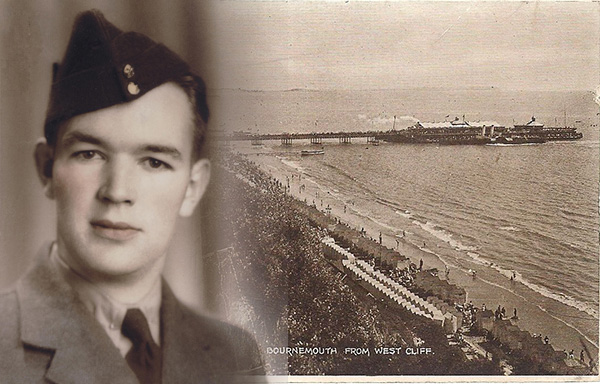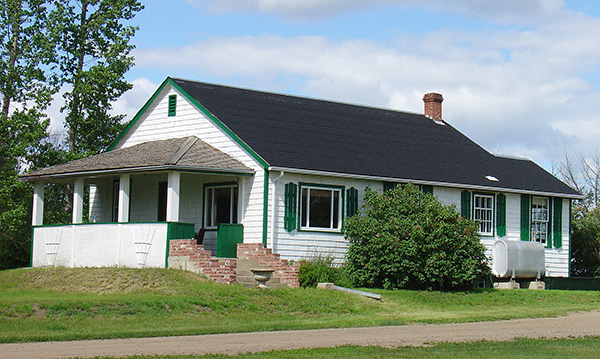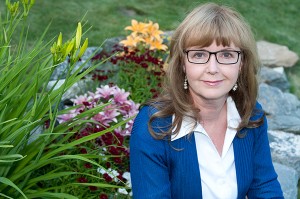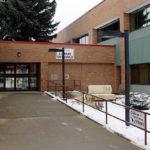Home »

My Dad’s Best Christmas: 1945
By Elinor Florence
A few years before he died, I asked my father, Douglas Florence of Invermere, what was the best Christmas he could remember. I expected him to recall his childhood, or a time when his own children were young. But without hesitation, he said: “Christmas 1945!” I asked him why, and here’s the story he told me.
* * * * *
 It was Christmas Eve, 1945. I was still on active duty in the Royal Canadian Air Force. The war had ended six months earlier, but I was just back from my posting as a payroll officer in India, and I was billeted at a hotel in Bournemouth, on the south coast of England.
It was Christmas Eve, 1945. I was still on active duty in the Royal Canadian Air Force. The war had ended six months earlier, but I was just back from my posting as a payroll officer in India, and I was billeted at a hotel in Bournemouth, on the south coast of England.
I was in no hurry to get home, unlike most of the other men who were eager to see their families. It took a long time to send hundreds of thousands of Canadian men and women home from Europe by ship, and there was quite a waiting list.
But I didn’t have much to go back to, except to work on my father’s farm at Richard, Saskatchewan. Since I wasn’t looking forward to arriving home in the middle of winter with nothing to do, I just kept my head down and waited for orders.
On that Christmas Eve, I was with my buddy Jack Anderson from Ottawa. We had received our presents from home – I had twenty-five dollars in cash, and Jack had a bag of oranges. When Jack found out about my money, he asked to borrow some so he could get his watch out of hock. It was a very special watch and he had been worried sick about going home without it. So we went down to the pawn shop and retrieved his watch.
“What we really need is some hard liquor,” I said. Of course, the English were still on strict rations and there was nothing but beer to be found anywhere in the country.
“Let’s go to this chemist’s shop I know about,” Jack said. “They might have something.”
A chemist in England is the same as a pharmacy. I wasn’t sure why a chemist would carry hard liquor, but when we were just outside the door, Jack announced: “I took their daughter out on a date once.”
“Oh, no,” I said, stopping short. “You’ve probably messed up everything.”
“Don’t worry, I was a perfect gentleman,” Jack insisted. I had my doubts, but we went into the shop and there was a woman behind the counter, the mother of Jack’s lady friend.
We asked her if she had anything to drink, and of course she said no, nothing. So I set Jack’s bag of oranges down on the counter, and a couple of them “accidentally” spilled out.
“Oranges!” the woman said, and her eyes got big. “My little boy is four years old and he’s never seen an orange. How much do you want for them?”
“We want something to drink,” I told her, and sure enough, she reached under the counter and pulled out a bottle of gin. So I gave her the oranges, and hid the bottle inside my battledress tunic as best as I could, and off we went to a pub.
We were standing in the pub drinking our beer and we started chatting with three Americans. Since it was Christmas, we bought them a round. One of them said enviously: “You know, you Canadians are so lucky.”
“Why is that?” I asked.
“They’ve got it all fixed up for you at home,” he replied. “The Canadian government is planning big things for you guys. When you get back you’re going to get help with a university degree, business, whatever you want.”
This was the first time we had heard of any benefits waiting for returning veterans, so naturally we were delighted. I was 28-years-old by then, and what I really wanted to do was buy my own farm, but I hadn’t been able to figure out how.
Despite my enthusiasm, I remembered to drink my beer with my right elbow flat against my side, so they wouldn’t see the bulge of the bottle in my tunic. But then the Americans asked to be excused for a moment. They went over in a corner with their heads together and I thought: “Oh-oh. They’ve seen our bottle and now there’s going to be trouble!”
“You take that one, and I’ll take that one,” Jack whispered. “The third one we’ll worry about later.”
But when the Americans came back, they hung their heads and apologized. They wanted to buy us a round in return, but the three of them had emptied their pockets and altogether they had only thirty-seven pence. We were so relieved we didn’t have to fight them that we bought them another beer, and in a while I brought out the bottle and we all had a party!
On Christmas morning, I woke up to hear a wonderful sound – all the church bells in the city ringing at once! I jumped out of bed, ran to the window and stuck my head out to listen.
The hotel where I was billeted was on top of a high hill overlooking the city and the ocean below. The pealing of bells could be heard from every direction, floating through the air from far and wide.
It was the most beautiful sound I have ever heard.
During the war, there was a ban on the ringing of church bells unless the Germans landed. It had been 1938, seven long years ago, when the church bells had last rung in England on Christmas Day.
As I stood there listening to the bells, I thought about the little boy with his oranges, and Jack with his watch, and the Americans with their hangovers, and the new life waiting for me at home, and peace all over the world, and I said to myself: “This is the best Christmas I’ve ever had.”
The Early Years
My father Douglas Percy Florence was born on December 4, 1917, on a farm near Richard, Saskatchewan, belonging to his parents George and Mary Margaret.
Dad had a typical farm boy’s upbringing, helping with the crops and the cattle and riding his horse across the fields to school. During the depression, money was so scarce that his parents wanted him to quit school, but he refused. He studied at night by the light of a coal oil lamp and earned his Grade 12 diploma. He proved to be especially proficient at mathematics.
After the war started, Dad wrote the civil service examination and, to his amazement, received a telegram asking him to report for work as an accounting clerk for the Department of National Defence headquarters in Ottawa.
Dad sold a calf to earn enough money for the train fare, and a week later he arrived in our nation’s capital, having never before been out of Saskatchewan. He started working for the government as an accounting clerk in 1940. He excelled in his position, which was exempt from military service, but he felt he should do his part for the war effort and enlisted in the Royal Canadian Air Force on July 22, 1941.
In a letter he wrote home to his parents, dated September 16, 1941, he wrote: “I am happy as a lark right now. I have no worries, nothing to think about except my honour to the uniform, and there isn’t a man here who doesn’t think it is a privilege to be wearing it!”
After basic training, on January 3, 1942, he was sent overseas to RCAF Torbay, Newfoundland – which was not part of Canada at that time. Newfoundland was the most highly militarized area in North America, since it was the jumping-off point for American and Canadian aircraft and ships heading overseas.
In May 1944 he sailed to England, where he served at several locations including RAF Digby in Lincolnshire, RAF Topcliffe in Yorkshire, and the RCAF Administration Headquarters, based in the same building that houses Harrods Department Store in London. (He had a close call when a V-1 flying bomb landed directly across the street from Harrods, demolishing a local pub.)
In early 1945 he was posted to India, joining the administration personnel supporting the RCAF squadrons flying in South East Asia.
When the war ended on August 9, 1945, Dad was still in India. He had taken a short leave to see the Taj Mahal, and was returning to his base on a train when news came that the second atomic bomb had been dropped, and Japan had surrendered.
He sailed for England in October, and spent Christmas 1945 in Bournemouth.
After the War
Although he was offered a civil service position back in Canada, Dad was eager to start his own farm. Always an independent sort, his years in the service made him realize that he never again wanted to answer to anyone but himself.
Dad arrived home in Saskatchewan in April 1946, where his first action was to eat one dozen fried eggs! He was so tired of eating only powdered eggs in the air force.
 Just one month later he went to a dance in Battleford, handsome and still tanned from the Indian sun. There he met June Light, daughter of the local postmaster. It was love at first sight.
Just one month later he went to a dance in Battleford, handsome and still tanned from the Indian sun. There he met June Light, daughter of the local postmaster. It was love at first sight.
With the help of a government loan from the Veterans’ Land Act, Dad found a piece of land perfect for farming – an abandoned airport near Brada, 12 kilometres east of North Battleford, formerly part of the British Commonwealth Air Training Plan.
Doug and June were married in 1948 and began their lifelong task of turning a flat, windswept piece of land into a successful farm they named Able Acres.
Dad had to plow up all the crested wheat and brome-grass runways used by the air force before he could plant his first crop. He re-modelled part of the barracks building to use as the home where I grew up.
My parents dug their own well, built barns and granaries, and planted a huge shelterbelt of poplars and spruces. They purchased another half-section next door, turned it into pasture and raised cattle. As well, Dad continued to farm the old homestead at Richard after his parents retired.
My parents also raised three children – I’m the eldest, followed by Robert and Mary Margaret. After we grew up, my sister and I moved away, but it was a happy day for all of us when my brother agreed to take over the farm, which is now many times larger than the original half-section where it all began. My brother built a new house in the same yard, but the former barracks building where I grew up is still being used by the family as a summer residence.
 In 1996 my parents moved to Invermere to be closer to me and my family. My father died in 2003, and my mother died in 2017.
In 1996 my parents moved to Invermere to be closer to me and my family. My father died in 2003, and my mother died in 2017.
Every December, as I remember our own happy childhood Christmases on the farm, I recall Dad’s voice as he told me about his very best Christmas!
 – Career journalist and bestselling author Elinor Florence of Invermere has written two wartime books. Her novel Bird’s Eye View tells the story of an idealistic Saskatchewan farm girl who joins the Royal Canadian Air Force and becomes an interpreter of aerial photographs. My Favourite Veterans is a non-fiction collection of interviews whose stories appeared previously on e-KNOW, including Cranbrook’s own Bud Abbott, and Jim Ashworth of Invermere.
– Career journalist and bestselling author Elinor Florence of Invermere has written two wartime books. Her novel Bird’s Eye View tells the story of an idealistic Saskatchewan farm girl who joins the Royal Canadian Air Force and becomes an interpreter of aerial photographs. My Favourite Veterans is a non-fiction collection of interviews whose stories appeared previously on e-KNOW, including Cranbrook’s own Bud Abbott, and Jim Ashworth of Invermere.
Elinor’s new novel Wildwood, about pioneer life in the Peace River, Alberta region, is available at Lotus Books and Coles in Cranbrook, and Sobey’s and Lambert-Kipp Pharmacy in Invermere.
For more information about all three books, visit Elinor’s website at www.elinorflorence.com or call her at 250-342-1621.







